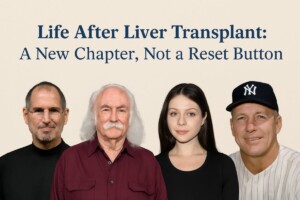A liver transplant is not the end of your journey—it’s a new beginning. But it’s not a return to your old life, either. It marks the start of a new normal—a life that’s often healthier and more stable than when you were battling cirrhosis or decompensated liver disease (DCLD), yet guided by responsibility, caution, and conscious choices.
In this life after liver transplant, you may find yourself breathing easier—literally and figuratively. The jaundice fades, ascites subsides, the fatigue lifts, and the cycle of frequent hospital admissions breaks. Your body begins to heal, your appetite returns, and you slowly regain strength. For many, it’s a dramatic transformation that feels like a second chance at life.
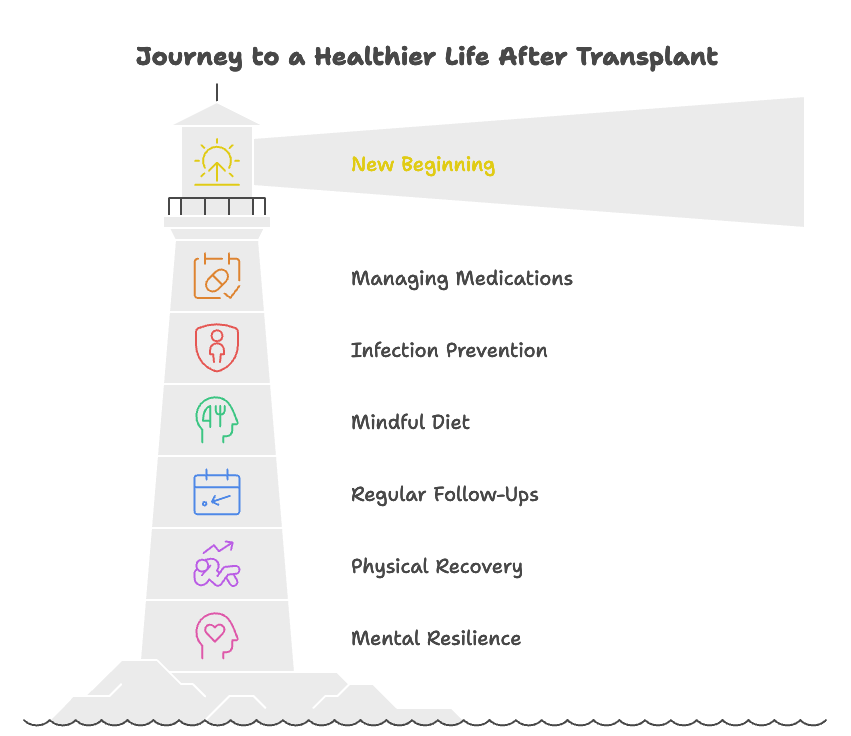
But this better life comes with a pinch of salt. Immunosuppressants must be taken every day, on time and for life. Infection risks are real and must be managed carefully. Dietary choices need mindfulness, and regular follow-ups are non-negotiable. Physical recovery goes hand-in-hand with mental resilience, and protein supplements often play a key role in reversing the chronic malnutrition that came before surgery.
“Healing is more than recovery. It is a commitment to protect the gift you’ve received.”
In this blog, let’s explore the truths, responsibilities, and real possibilities that shape life after liver transplant.
What makes it fulfilling, where caution is needed, and how to thrive in this beautifully different journey ahead.Life After Liver Transplant: Better, But Not Effortless
🕒 When Can I Resume…?
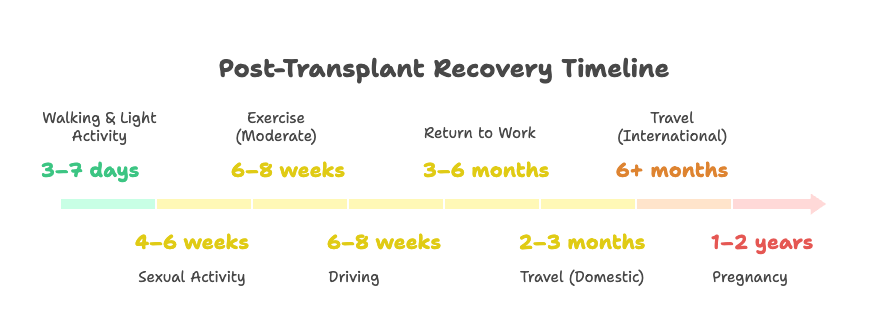
⚠️ Always confirm with your transplant team before resuming any major activity.
💡 “Recovery isn’t just getting back to life—it’s adapting to a new one, wisely.”
Many liver transplant recipients find life after transplant significantly better than their time living with liver disease, especially those patients and caregivers who consistently follow the guidance given during post-liver transplant counselling sessions. But it’s important to understand: life after liver transplant is not like life before liver disease began.
You’ve gained a second chance, but it comes with: Reality Check
Immunosuppressant medications to prevent rejection
Infection prevention measures to avoid serious illness
Structured diet and hydration plans
Regular follow-ups and blood tests
Lifestyle restrictions, including complete alcohol abstinenceThis new life may feel different, but it can be deeply rewarding with the right mindset.
"You’re not going back. You’re going forward—with wisdom and strength."
Life After Liver Transplant in a Child
- Significant improvement in overall health, energy, and quality of life.
- Catch-up growth and development are commonly seen in young children.
- ABO-incompatible transplants often succeed well due to immature immune systems.
- Requires lifelong multidisciplinary care and regular follow-ups.
- Risks include rejection, infections, and biliary/vascular complications, though outcomes are generally excellent.
- Survival rates in children are high, often better than in adults.
The New Normal: Key Elements You Must Embrace
🩺 Health Alerts to Watch for in Your New Normal Life
These are not guarantees—they are just possibilities to be aware of. Most people do very well after transplant, especially with regular follow-up and healthy habits.
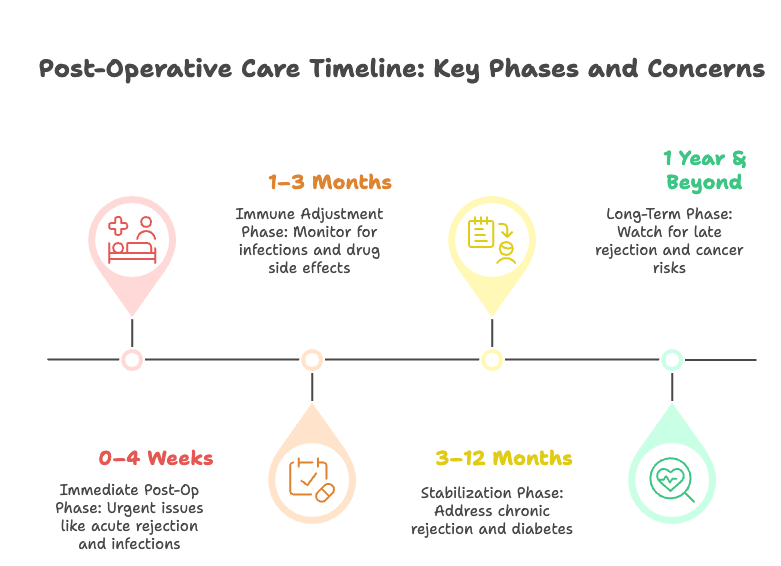
1. Immunosuppressants: Your Lifelong Companions
You will need to take medicines daily to prevent your body from rejecting the new liver. These drugs (like Tacrolimus, Mycophenolate, or Certican) lower your immunity and come with side effects, like weight gain, high blood pressure, or increased infection risk.
💡 But without them, rejection can occur silently.
⚠️ Missing doses or changing medications without your doctor’s approval is risky.“Every pill is a promise to your new liver. Don’t break it.”
2. Infection Prevention: Stay Cautious, Stay Safe
Immunosuppressants make you more vulnerable to infections, especially in the first six months.
Avoid:❌
Raw or uncooked foods (sushi, salads outside, etc.)
Street food or unboiled water
Crowded places without masks
Unwashed hands or shared itemsDo:✅
Maintain hygiene at home and outside
Use masks in crowded/public places
Follow up on vaccinations (flu, pneumonia, COVID, etc.)“Protection is not paranoia. It’s preparation.”
3. Diet and Nutrition: Repair, Rebuild, Recharge
After years of poor nutrition due to liver disease, your body needs to rebuild. Protein deficiency and muscle loss are common.
Focus on:
- High-protein, low-salt diet
- Avoiding raw meat or seafood
- Adequate hydration (2–2.5 litres daily)
- Protein supplements (as advised)
- Small, frequent meals
Avoid alcohol completely. Even a small amount can be harmful.
“Eat to fuel healing—not just to fill your plate.”
4. Navigating the Emotional Landscape: You’re Not Alone
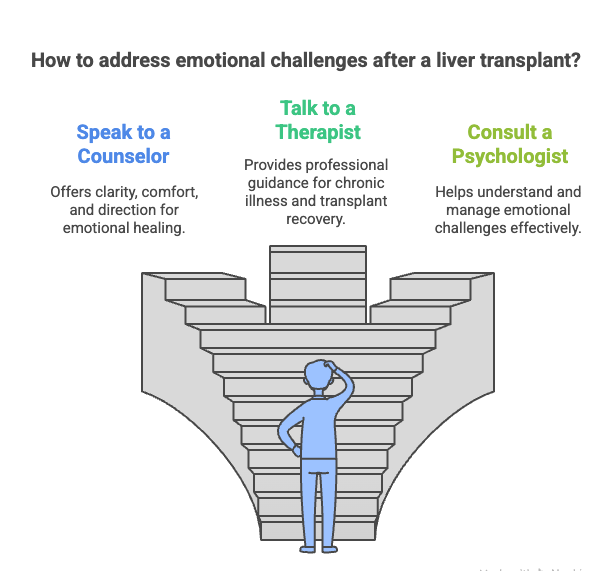
Mental and emotional health after liver transplant is just as important as physical healing. It’s natural to feel a whirlwind of emotions once the surgery is behind you. Some recipients describe feeling incredibly grateful but also unexpectedly anxious, fearful, or even guilty, especially if they received a liver from a deceased donor.
These feelings are valid. You’ve been through something life-altering. What matters now is how you process and respond to these emotions.🧠 Talk About It
Bottling up emotions can delay true healing. Consider speaking to a counsellor, therapist, or psychologist who understands chronic illness and transplant recovery. Even a few sessions can offer clarity, comfort, and direction.
You’re not alone. Support groups — whether online or in your city — can connect you with fellow survivors who truly “get it.” Sharing your story, hearing others’, and learning how others cope with challenges can be deeply reassuring. Many find lifelong friendships and emotional strength in these communities.🪷 Practice Mindfulness or Journaling
Mindfulness practices, like meditation, deep breathing, or even a daily gratitude list, help reduce anxiety and center your thoughts. Journaling your emotions and milestones, even the hard days, can give you perspective on how far you’ve come — and where you’re headed.Mental and Emotional Health After Liver Transplant: Don’t Ignore the Mind
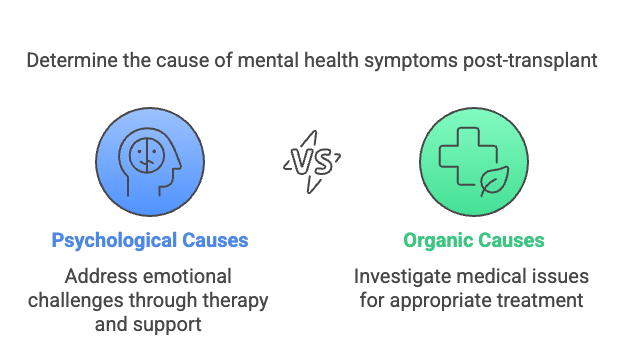
It’s easy to assume that emotional challenges like anxiety, low mood, or guilt after a liver transplant are “just psychological.” But that’s only part of the story. Altered mental status — such as confusion, irritability, excessive drowsiness, or sudden behavioural changes — can have organic causes too.
These symptoms shouldn’t be brushed off.
🩺 When the Mind Reflects the Body
In transplant patients, mental changes may signal underlying medical issues such as:
- Tacrolimus toxicity (high blood levels of immunosuppressants)
- Sepsis or systemic infections
- Electrolyte or metabolic imbalances
- Rejection episodes affecting the graft function
These are not just emotional shifts — they can be urgent medical signs. That’s why it’s crucial to inform your liver transplant team if you or your loved one experiences unusual mental changes, even if they seem mild.
“Healing doesn’t mean the damage never existed. It means the damage no longer controls your life.”
5. Routine Medical Follow-Up: Non-Negotiable
Skipping follow-ups is dangerous. Your transplant team monitors liver function, drug levels, kidney health, and early signs of rejection.
Regular tests include:
Liver function tests
Tacrolimus/other drug levels
Blood pressure, sugar, weight
Cancer surveillance (especially if previous liver disease was from Hepatitis B/C)“Early detection prevents complications. Show up for your future.”
6. Red Flags: When to See a Doctor Immediately
🚩 Call or visit your transplant centre if you experience:
Fever > 100.4°F (38°C)
Persistent vomiting or diarrhea
Decreased urine output
Yellowing of eyes/skin (jaundice)
Mental confusion or excessive drowsiness
Pain or swelling near the surgery site“Trust your instincts. Report early, act early.”
7. Social Myths and How to Handle Them
🔊 You may hear:
"You have a new liver—you’re fully normal now."No. You are stable, but dependent on medicines and careful routines.
"Can’t you drink now? You’re fixed."No. Alcohol can harm your new liver. It’s a lifelong NO.
"You should be grateful and not complain."You can be grateful and honest about your challenges.
It’s important to remind yourself that even if you’re feeling better, ongoing care and attention are crucial to ensure your new liver stays healthy.
⚠️ Reality check: Taking care of your liver doesn’t stop after surgery. It’s a lifelong commitment to follow the guidelines and stay on top of your health.
Real Possibilities: What You Can Look Forward To
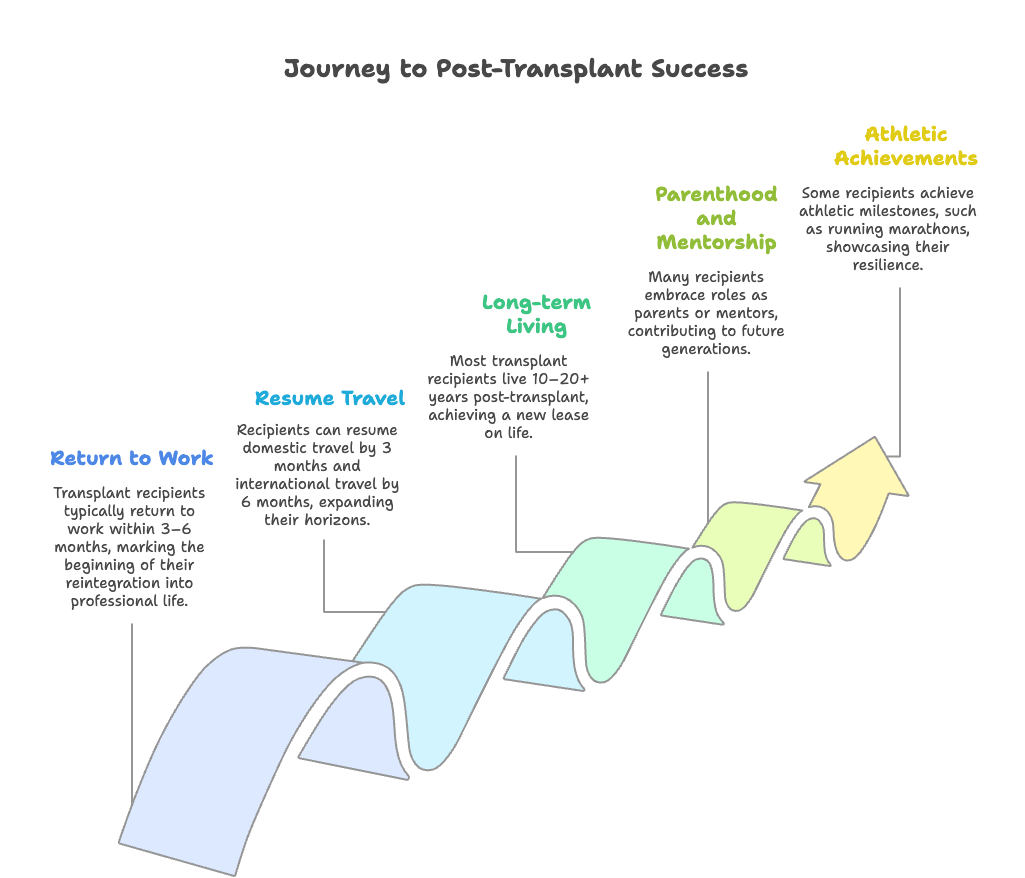
With good care and discipline, most transplant recipients:
Return to work within 3–6 months
Resume travel (domestic by 3 months, international by 6)
Live 10–20+ years post-transplant
Become parents, mentors, or even athletesSuccess stories include recipients who have:
Run marathons
Returned to teaching, engineering, caregiving
Raised children post-transplant“Your future is open. You just need to walk it mindfully.”
Technology, Telehealth & AI in Monitoring
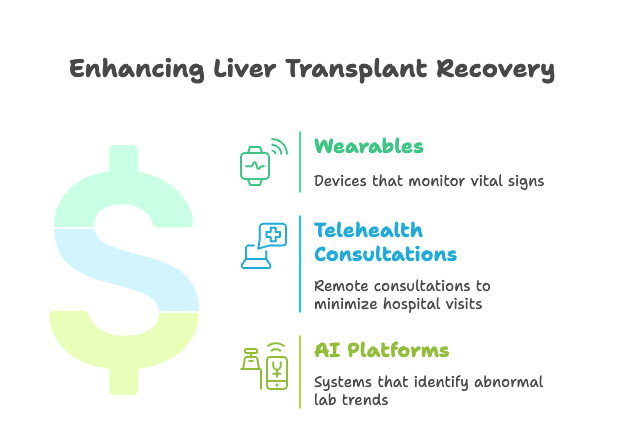
Today’s tools help make recovery smoother:
Wearables track vitals
Tele consults reduce hospital visits
AI-based platforms flag abnormal lab trendsThese support smarter, personalised care.
“Your recovery doesn’t need to be alone—or offline.”
👤 Real Stories, Real Lessons: Famous Lives After Liver Transplant
Liver transplant is not just a surgery—it’s a new chapter. The life after liver transplant of these well-known people around the world reminds us that while the journey is unique for each person, the principles of discipline, follow-up, and lifestyle change remain universal.
🌿 Steve Jobs (Apple Co-founder): A Brilliant Mind, A Complex Illness
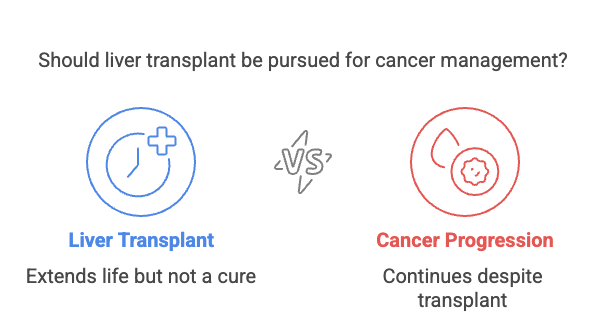
- Liver Transplant Year: 2009
- Underlying Disease: Pancreatic neuroendocrine tumour (PNET), diagnosed in 2004
- Why the Liver Transplant: His rare cancer had metastasised to the liver
Steve Jobs’ story often appears in transplant discussions, but it’s important to understand the medical reality. He didn’t suffer from cirrhosis or typical liver failure. Instead, his cancer—a rare and slow-growing form of pancreatic tumour—had spread to his liver.
In 2009, he underwent a liver transplant at Methodist University Hospital in Tennessee. The goal was not to cure the cancer, but to buy time—to replace a liver overtaken by tumour with a new one that could give him a few more years. It did. He returned to work and launched the iPad.
But the transplant did not eliminate the cancer. It likely delayed the inevitable, and by 2011, the disease progressed again. He passed away at age 56.
🔍 Reality Check:
A liver transplant cannot cure cancer that has spread. In select cases like Steve Jobs’, it can extend life. But the key takeaway is this: transplants can help manage disease progression but are not always a cure.
🧘 Gentle Reminder:
In patients with malignancy, transplant decisions are complex and individualised. They depend on tumor type, size, spread, and aggressiveness—not just organ failure.
🌿 David Crosby (Legendary Musician): A Second Chance at Life
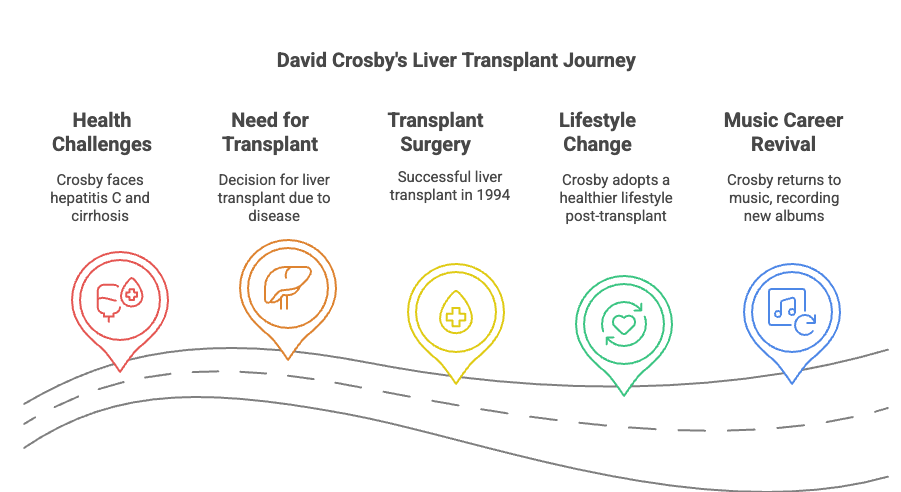
- Liver Transplant Year: 1994
- Underlying Disease: Hepatitis C-related cirrhosis
- Why the Liver Transplant?: End-stage liver disease due to Hepatitis C
David Crosby, a member of the iconic band Crosby, Stills & Nash, faced significant health challenges due to his battle with hepatitis C, which led to cirrhosis, a late-stage liver disease. He needed a liver transplant, and he got one in 1994. His liver transplant was a true second chance. After the surgery, Crosby returned to his music career and even recorded more albums.
Crosby has been candid about his lifestyle before the transplant, admitting to heavy drinking and drug use, which contributed to his liver disease. After the transplant, he committed to a healthier life, turning the corner not just physically, but also emotionally and spiritually.
🔍 Reality Check:
The transplant was life-saving, but the commitment to a healthier lifestyle was just as critical. Like Crosby, many recipients must change their habits post-transplant—especially alcohol use—because the immune-suppressive medications used to prevent organ rejection can make the liver more vulnerable to damage.
🧘 Gentle Reminder:
Recovery isn’t just physical. It’s also about mental and emotional healing and taking responsibility for one’s future health.
🌿 Mickey Mantle – MLB Star: A Tragic Lesson in the Cost of Alcohol
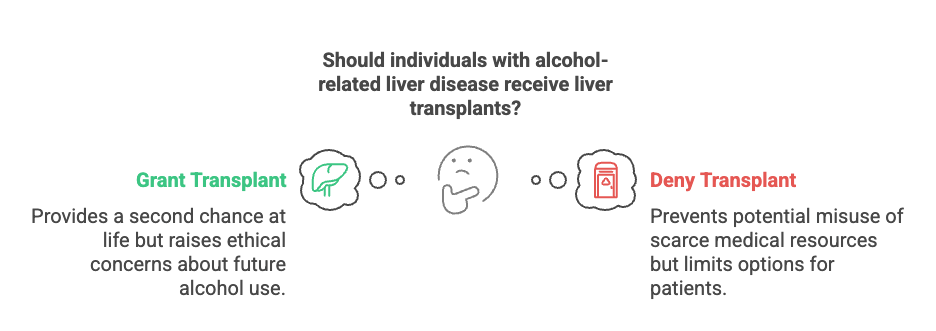
- Liver Transplant Year: 1995
- Underlying Disease: Cirrhosis of the liver (due to chronic alcohol abuse), hepatitis and liver cancer
- Why the Liver Transplant? Mantle’s cirrhosis was caused by years of heavy alcohol consumption, hepatitis and liver cancer.
Mickey Mantle’s Journey:
Mickey Mantle, a legendary MLB player known for his prowess on the field, struggled with alcoholism for much of his life. In 1995, Mantle received a liver transplant after his liver failed due to cirrhosis caused by his drinking.
Although the transplant gave him a brief 2-month period of improved health, it was too late to undo the damage caused by years of alcohol abuse. Mantle died later that same year. His story is a powerful reminder of the long-term effects of alcohol on the liver and the limitations of a transplant if the underlying cause of liver disease isn’t addressed.
🔍 Reality Check:
While a liver transplant can save lives, it’s crucial to make permanent lifestyle changes, especially avoiding alcohol, to ensure the longevity of the transplant. The transplant raised ethical questions about whether an individual with alcohol abuse should receive a scarce organ.
🧘 Gentle Reminder:
Mantle’s life serves as a cautionary tale about the importance of addressing the root causes of liver disease and living a healthier lifestyle post-transplant to avoid complications.
🌿 Michelle Trachtenberg: The famous Gossip Girl actress and Liver Transplant
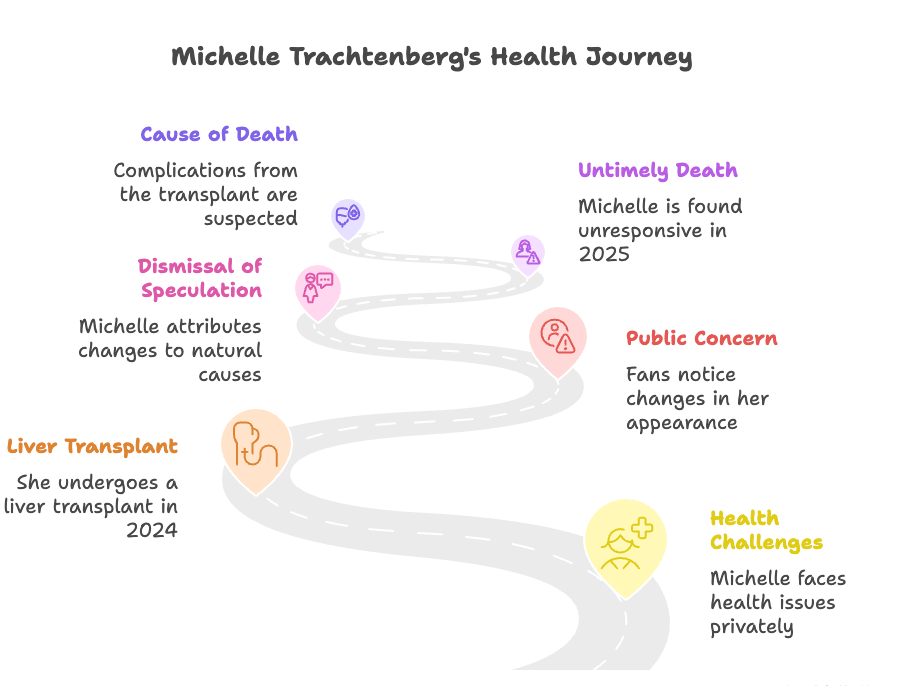
- Liver Transplant Year: 2024
- Underlying Disease: Undisclosed; possible liver failure
- Why the Liver Transplant? Specific reasons not publicly confirmed; signs pointed to liver-related health issues
Michelle Trachtenberg’s Journey:
Michelle Trachtenberg, renowned for her roles in Buffy the Vampire Slayer and Gossip Girl, faced health challenges in the years leading up to her untimely death at 39. In early 2024, she underwent a liver transplant, though she chose to keep the details of her health struggles private. Fans had expressed concern over her appearance, noting signs like jaundice, but Trachtenberg dismissed speculations, attributing changes to natural causes. Tragically, on February 26, 2025, she was found unresponsive in her New York City apartment. While the exact cause of death remains undetermined due to her family’s request against an autopsy, it’s believed that complications from her liver transplant may have played a role.
🔍 Reality Check:
Liver transplants, while life-saving, come with significant risks, including organ rejection and complications from immunosuppressive medications. Trachtenberg’s experience underscores the importance of post-transplant care and monitoring.
🧘 Gentle Reminder:
Michelle’s story highlights the challenges individuals may face privately, even while in the public eye. It’s a poignant reminder of the importance of health awareness and the need for support systems during recovery journeys.
🌿 Ian (UK): Living Fully After Two Liver Transplants
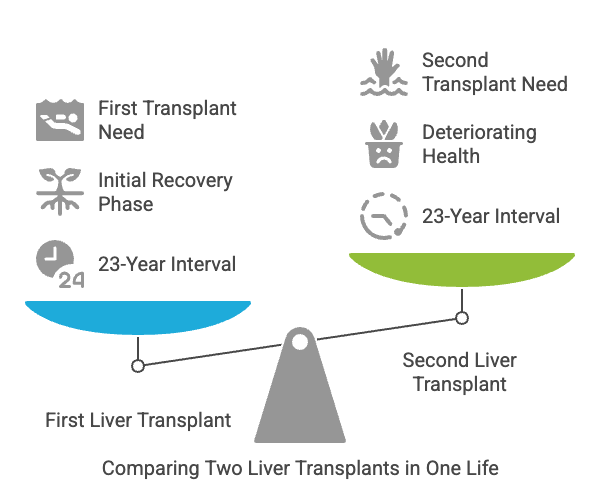
- Liver Transplant Years: 1985 and 2008
- Underlying Disease: Autoimmune liver disease
- Why the Liver Transplants? Progressive liver failure due to autoimmune conditions
Ian’s Journey:
Ian underwent his first liver transplant in 1985, a time when such procedures were still relatively new. His transplanted liver served him well for 23 years before he required a second transplant in 2008. Now, decades later, Ian continues to live a fulfilling life, attributing his longevity to the care he received and his commitment to health.
🔍 Reality Check:
While liver transplants are life-saving, they are not always a one-time solution. Long-term success often depends on ongoing medical care and lifestyle adjustments.
🧘 Gentle Reminder:
Ian’s story exemplifies the importance of perseverance and the advancements in transplant medicine that make long-term survival possible.
Final Thoughts: A Second Chance, A Wiser Life
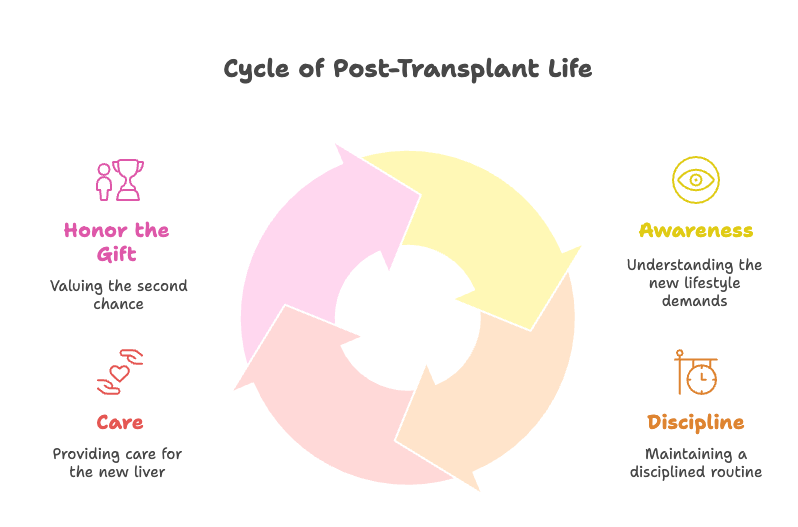
You didn’t go through a liver transplant just to hit rewind. This wasn’t a pause—it was a powerful pivot.
Your old life, shaped by liver disease, was filled with exhaustion, fear, and uncertainty. Post-transplant life offers something better—but it’s not effortless. It asks for awareness, discipline, and care. It’s not about going back to who you were before illness—it’s about becoming someone stronger because of what you’ve overcome.
You now carry a precious gift—a new liver, a second chance. Honour it. Protect it. Learn what it needs to thrive.
That means:
- Staying consistent with your medications
- Keeping infections at bay
- Following up regularly with your medical team
- Nurturing your body through mindful eating and exercise
- Taking care of your mental and emotional well-being
You’ve traded constant hospital visits and weakness for a more vibrant life—but only if you respect its boundaries.
🌱 Live your “new normal” with intention, courage, and gratitude.
Let each step you take from here be guided by the wisdom your journey has given you.
“You didn’t go through all this to go halfway. You’re here to live fully—and wisely.”
Download here Post-Liver Transplant Counselling advice ⬇️
🌱 Ready to Embrace Your New Normal?
Life after liver transplant can feel unfamiliar — but clarity comes with the right support. Take the next step in your recovery with guidance and trusted resources.
- 📘 Explore recovery guides & trusted tools
- 💬 Book a 1:1 call with Dr. Tanuja Mallik — expert care from someone who’s walked this path with hundreds.
Frequently Asked Questions
How does life change after a liver transplant?
Life improves significantly — energy returns, symptoms reduce, and overall health stabilises. It’s a second chance, but it comes with new responsibilities.
How does your personality change after a liver transplant?
Some patients feel emotionally sensitive or introspective. This is often temporary and related to medication, trauma recovery, or a life perspective shift.
Can a liver transplant cure NASH?
Yes. The transplant replaces the damaged liver, but healthy lifestyle changes are still crucial to prevent recurrence in the new liver.
Does brain fog go away after a liver transplant?
Yes, most patients report better mental clarity as toxins clear from the system. Some experience temporary memory or focus issues early post-op.
How long will my liver transplant last?
With proper care, liver transplants can last 10–20 years or more. Long-term success depends on medication adherence and lifestyle choices.
What can I expect my quality of life to be after a liver transplant?
Most patients return to a near-normal life — working, travelling, socialising — with minimal restrictions after the recovery period.
Will my liver disease come back after a liver transplant?
It depends on the original disease. For many, the condition won’t return, but in some (e.g., autoimmune, viral hepatitis), recurrence is possible with time.
How much pain is typical after the surgery?
Pain is expected initially, but is managed well with medications. It reduces significantly in a week.
Will I need to take medication after my liver transplant?
Yes. Lifelong immunosuppressants are essential to prevent organ rejection. Doses may reduce over time.
(💡 check Link “Know Your Medicine” ebook or post)
Can I drink alcoholic beverages after my transplant?
No. It is strongly advised not to drink. Alcohol can damage the new liver and interact with medications.
Will I be able to have children after my transplant?
Yes. Many men and women go on to have healthy children. Discuss timing and medication safety with your transplant team. 👉 Want to learn more? Download our eBook: “Pregnancy After Liver Transplant” [Available here].
